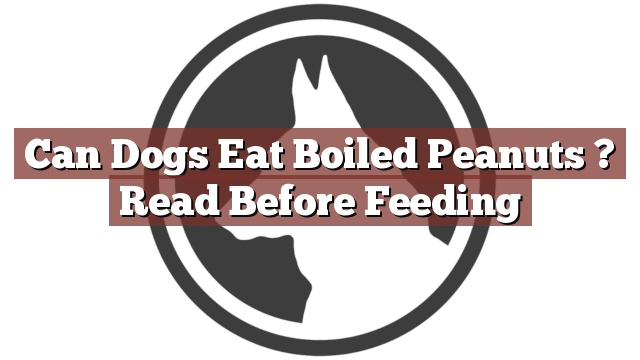Understanding Your Dog’s Dietary Needs
As a responsible pet owner, it is essential to understand your dog’s dietary needs to ensure their overall health and well-being. Dogs have different nutritional requirements than humans, and certain foods that are safe for us may not be suitable for them. It is important to feed dogs a balanced diet that includes high-quality dog food formulated specifically for their needs.
Can Dogs Eat Boiled Peanuts? Read Before Feeding
Many pet owners wonder, can dogs eat boiled peanuts? While peanuts are a popular and nutritious snack for humans, it is important to be cautious when considering feeding them to your furry friend. The answer to whether dogs can eat boiled peanuts is yes, but with some precautions.
Peanuts themselves are not toxic to dogs. In fact, they contain healthy fats, protein, and other essential nutrients. However, before feeding your dog boiled peanuts, there are a few things to keep in mind. Dogs have a shorter digestive tract than humans, and some dogs may have difficulty digesting peanuts, especially if they are not properly cooked or are too salty. Additionally, peanuts can pose a choking hazard, especially for small dogs or those prone to gulping their food.
Pros and Cons of Feeding Boiled Peanuts to Your Dog
Feeding boiled peanuts to your dog has both pros and cons that should be considered before making them a regular part of their diet.
Pros:
-
Nutritional Value: Boiled peanuts are a good source of healthy fats, protein, vitamins, and minerals that can contribute to your dog’s overall health. They contain essential nutrients like vitamin E, niacin, and folate.
-
Variety and Enrichment: Offering boiled peanuts as an occasional treat can add variety to your dog’s diet and provide enrichment by introducing different textures and flavors to their meals.
Cons:
-
Digestive Issues: Some dogs may have trouble digesting peanuts, leading to symptoms such as diarrhea, vomiting, or an upset stomach. It is important to observe your dog’s reaction to peanuts and discontinue feeding them if any adverse effects occur.
-
Allergy Risk: Peanuts are a common allergen for both humans and dogs. If your dog has a history of food allergies, it is best to avoid feeding them peanuts altogether, as they can cause allergic reactions like itching, skin problems, or even more severe symptoms.
In Conclusion: Consider Your Dog’s Health and Consult a Vet
While dogs can eat boiled peanuts, it is important to consider your dog’s individual health, dietary needs, and potential allergies before introducing them into their diet. If you are considering feeding your dog boiled peanuts, it is recommended to consult with your veterinarian first. They can assess your dog’s specific needs and provide guidance on whether boiled peanuts are a suitable addition to their diet.
Remember, a balanced and nutritious diet tailored to your dog’s needs is crucial for their overall health. Always prioritize their well-being and make informed decisions when it comes to their dietary choices.
Thank you for taking the time to read through our exploration of [page_title]. As every dog lover knows, our furry friends have unique dietary needs and responses, often varying from one canine to another. This is why it's paramount to approach any changes in their diet with caution and knowledge.
Before introducing any new treats or making alterations to your dog's diet based on our insights, it's crucial to consult with a veterinarian about [page_title]. Their expertise ensures that the choices you make are well-suited to your particular pet's health and well-being.
Even seemingly harmless foods can sometimes lead to allergic reactions or digestive issues, which is why monitoring your dog after introducing any new food item is essential.
The content provided here on [page_title] is crafted with care, thorough research, and a genuine love for dogs. Nevertheless, it serves as a general guideline and should not be considered a substitute for professional veterinary advice.
Always prioritize the expert insights of your veterinarian, and remember that the health and happiness of your furry companion come first.
May your journey with your pet continue to be filled with joy, love, and safe culinary adventures. Happy reading, and even happier snacking for your canine friend!

